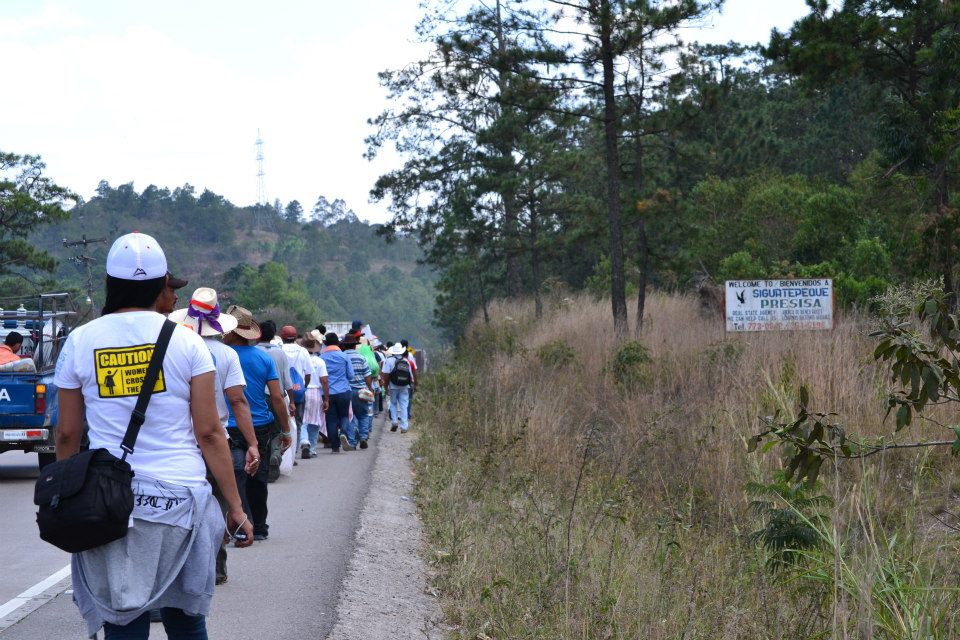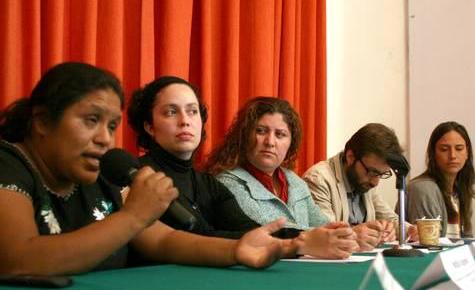With the compelling theme, “A promise is a promise: Time to take action and end violence against women”, this year’s International Women’s Day (March 8) sought to publicize the rampant problem of violence against women around the world. While every country is fraught with different forms and levels of violence against women, it is clear that in times of conflict and/or instability, women pay the highest price as they are faced with unprecedented backlash and violence for either defending their rights or simply because they are women.
This is precisely the case in Mesoamerica where the context is characterized by growing insecurity, militarization and the dismantling of state and social safety nets. Statistics show that in 2011 alone, over 460 women were murdered in Honduras; while in Guatemala, more than 700 women lost their lives to violence in 2012. With failing governments and legal mechanisms, impunity has become more dramatic, forcing women to come together to hold the line and respond to their own needs for protection and survival.
Stepping onto the frontlines, these women human rights defenders spotlighted their movements for justice during International Women’s Day. Bringing to light their unique and diverse strategies, women activists across Mesoamerica, including JASS Mesoamerica and numerous partners, engaged in a range of activities to denounce the violence they are facing and demand that their rights and the human rights of all women be respected. Below are some of the actions that were carried out.
Walking for Dignity
 As violence surges and militarized responses continue to prevail, homicides, femicides and violence against women have reached alarming rates in Honduras since the coup in 2009. Calling for justice, thousands of people marched across the country for 11 days from the city of El Progreso to the national congress in Tegucigalpa to demand the suspension of the mining law and the Law of Special Development Regions (most commonly known as Charter Cities), a law that would violate national sovereignty and sell Honduran land to foreign entities – the creation of a state within a state. From every corner of the state, diverse women – feminists, afro-Honduran, indigenous, students, among others – joined the walk, reaffirming their commitment to build a stronger and more just homeland.
As violence surges and militarized responses continue to prevail, homicides, femicides and violence against women have reached alarming rates in Honduras since the coup in 2009. Calling for justice, thousands of people marched across the country for 11 days from the city of El Progreso to the national congress in Tegucigalpa to demand the suspension of the mining law and the Law of Special Development Regions (most commonly known as Charter Cities), a law that would violate national sovereignty and sell Honduran land to foreign entities – the creation of a state within a state. From every corner of the state, diverse women – feminists, afro-Honduran, indigenous, students, among others – joined the walk, reaffirming their commitment to build a stronger and more just homeland.
I was in the Walk because I believe in life, happiness and hope. I believe that we can change this reality that oppresses us even though they tell us we can’t. This is our path and our feminist spirit. – Noemí Dubón, Forum of Women for Life (Source: CIP Americas)
To close the national march, women organized a day of reflection, protest and dance in celebration of International Women’s Day and called for an end to violence against women in front of the national congress. Women led the march, directed traffic and echoed through the streets: Ni golpes de estado, Ni golpes a las mujeres! La revolución será feminista, o no será! The Step by Step for Dignity and National Sovereignty march and the March 8th event was organized by dozens of organizations and networks, including the Center for Women’s Rights, the National Women Human Rights Defenders Network and JASS.
Women Defenders to CSW: Uphold Women’s Rights & End VAW
“The current regional security model…has neither eradicated organized crime nor guaranteed citizen security. Rather, there have been increases in … violence against women and against WHRD … [which has been] entrenched as a mechanism of social control.”
Over 200 women human rights defenders (WHRD) from across Mesoamerica put out a joint statement calling on member states participating at the 57th session of the UN Commission on the Status of Women to take effective and immediate measures to eradicate violence against women and WHRD, end the culture of impunity and comply with observations made by the UN CEDAW Committee and the UN Human Rights Council on protection of WHRD.
Released on March 7, 2013 by the Mesoamerican Women Human Rights Defenders Initiative, the statement highlighted that at least 35 women defenders have been murdered since 2010 in Mexico, Honduras and Guatemala and authorities have failed to investigate and prosecute the perpetrators in all of these cases.
Nobel Laureates Amplify Women’s Demands
As the Organization of American States’ (OAS) General Assembly prepare to finalize reforms to the Inter-American Human Rights System (IAHRS), which may potentially dismantle the Court and Commission, JASS and six other human rights organizations held a press conference on March 7, 2013 to release a letter by the Nobel Women’s Initiative in support of the IAHRS in the promotion and protection of women’s rights and of women human rights defenders. Held in Mexico City and framed around International Women’s Day, this press conference featured JASS Mesoamerica’s regional director Marusia López, who read the official letter and highlighted the important role that the IAHRS, in particular the Inter-American Commission on Human Rights and the Inter-American Court of Human Rights, have played in denouncing and emitting sentences and recommendations on cases of sexual violence, torture, femicide, attacks against WHRD and other forms of violence against women. Signed by the chair of the Nobel Women’s Initiative, Jody Williams, the letter recognized that violence against women is one of the principle obstacles in advancing democracy in the Americas.
Although the reform process promises to strengthen the IAHRS, a number of states have introduced and supported various reforms that not only threaten the reach, autonomy and effectiveness of the IAHRS, but practically dismantle the Court and Commission – the most important regional human rights mechanisms that have proven to be key in protecting rights, especially women’s rights, and holding governments accountable.
JASS continues to support the strengthening of the IAHRS and has partnered with numerous regional organizations, including the Center for Justice and International Law (CEJIL), Autonomous Movement of Women (MAM,Nicaragua) and Tlachinollan Human Rights Center (Mexico), to pressure member states, in particular the United States and Mexico, to respect the IAHRS.
The Inter-American Human Rights System has protected women human rights defenders and survivors of violence by making the work of such defenders visible, investigating complaints and contributing to prevention. This is vital work in a region where threats against some women and their communities are a daily fact of life. – Open letter to the OAS
On March 21st, the eve of the General Assembly, the Nobel Women’s Initiative released a second statement to the OAS in response to further concerns of human rights and women’s organizations across the Americas.


























